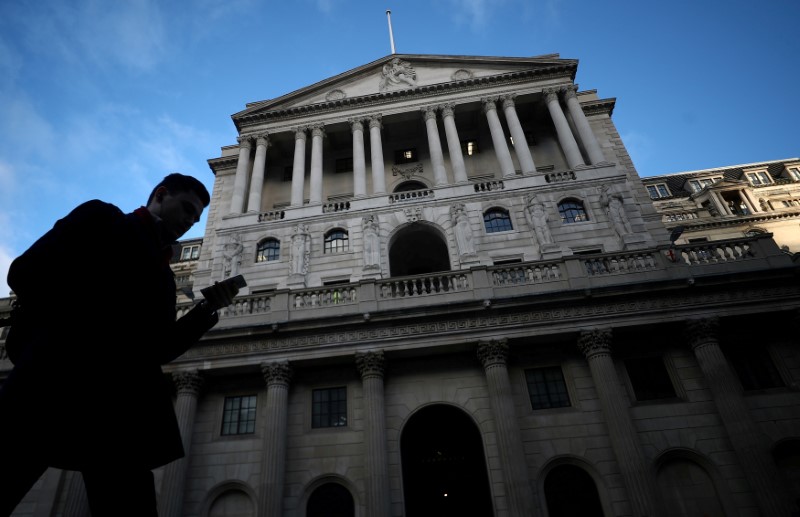By David Milliken
SOUTHAMPTON, England (Reuters) - The Bank of England will probably need to raise interest rates sooner than financial markets expect, policymaker Michael Saunders said on Monday, adding his voice to an unexpectedly hawkish message from the central bank's chief economist on Saturday.
Saunders, the first of the current Monetary Policy Committee members to vote for a rate rise in 2018, said the central bank would not necessarily wait until all Brexit uncertainties were resolved before raising interest rates again.
Financial markets currently think the BoE is more likely to cut rates than to raise them over the coming year, reflecting signs that trade conflict between the United States and China is hurting the world economy, and a dovish shift by the U.S. Federal Reserve.
This contrasts with the policy outlook set out by the BoE last month, when Governor Mark Carney highlighted that inflation was likely to overshoot the BoE's target over the coming years if it did not raise rates faster than was priced into markets.
"We probably would have to return to something like a neutral stance earlier than markets project," Saunders said in a speech hosted by the Institute of Directors at Southampton's Solent University.
"I want to stress that the MPC does not necessarily have to keep rates on hold until all Brexit uncertainties are resolved," Saunders added, noting the BoE had raised rates twice since Britain voted to leave the EU, in November 2017 and August 2018.
Andy Haldane, the BoE's chief economist, said in an opinion piece in Saturday's edition of the Sun newspaper that the time was nearing "when a small rise in rates would be prudent to nip any inflationary risks in the bud".
The BoE announces its next rate decision on June 20.
Saunders said he was not trying to signal how he would vote at a particular meeting, and would pay close attention to incoming economic data.
How fast the economy was growing, relative to its sustainable trend, was one of the key things to watch at a time when there was little or no spare capacity, and another rate rise before Britain left the EU could not be ruled out, he said.
MINI-CYCLE
The most recent numbers paint a downbeat picture, with official figures earlier on Monday showing the British economy shrank 0.4% in April, the biggest drop since March 2016, driven by a slump in car production.
Many carmakers temporarily stopped production in April due to fears of disruption to imports of components around the March 29 date when Britain had been due to leave the EU, and were unable to change plans after Prime Minister Theresa May announced a delay until Oct. 31.
Saunders said that the fall in growth was not a surprise to the BoE, after stock-building by manufacturers had boosted growth in the first quarter of 2019.
"Our internal forecast had been of pretty soft numbers in April, and the April numbers were weak," he said in a question-and-answer session after his speech.
In addition, slowing global growth "will prove to be another mini-cycle, with a mild pickup during this year", despite ongoing trade tensions.
Business investment was also likely to strengthen once there was more clarity about the terms on which Britain would leave the EU, he said.
He added that it would be dangerous to wait until all signals of inflation from pay, prices and other parts of the economy were "flashing red" before raising rates again.

"Such an approach would make it less likely that tightening would be limited and gradual, and more likely that the economy would face a painful adjustment," Saunders said.